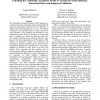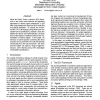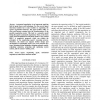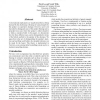185 search results - page 30 / 37 » A Representationalist Theory of Intention |
HICSS
1999
IEEE
13 years 12 months ago
1999
IEEE
The Technology Acceptance Model (TAM) represents an important theoretical contribution toward understanding IS usage and IS acceptance behaviors [6, 19]. However, as noted by seve...
IJCAI
1997
13 years 9 months ago
1997
While the Belief, Desire, Intention (BDI) framework is one of the most influential and appealing approaches to rational agent architectures, a gulf often exists between the high-l...
JSW
2008
13 years 7 months ago
2008
This paper presents a role-based agent teamwork language called RoB-MALLET (Role-Based Multi-Agent Logic Language for Encoding Teamwork). Roles have been used to form multi-agent t...
JSW
2008
13 years 7 months ago
2008
Automated negotiation is an important applying field of agent theory and technology. For the current agent theoretical models have some troubles in explaining the agent's nego...
CORR
1998
Springer
13 years 7 months ago
1998
Springer
Conversational implicatures are usually described as being licensed by the disobeying or flouting of some principle by the speaker in cooperative dialogue. However, such work has...




